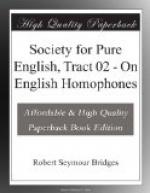This Society was called into existence by the widespread interest in linguistic subjects which is growing on the public, and by the lamentable lack of any organized means for focussing opinion. It responds to that interest, and would supply that want.[30] There is no doubt that public opinion is altogether at sea in these matters, and its futility is betrayed and encouraged by the amateurish discussions and obiter dicta that are constantly appearing and reappearing in the newspapers. Our belief is that if facts and principles were clearly stated and thoroughly handled by experts, it would then be possible not only to utilize this impulse and gratify a wholesome appetite, but even to attract and organize a consensus of sound opinion which might influence and determine the practice of our best writers and speakers.
[Footnote 30: Neither the British Academy nor the Academic Committee of the Royal Society of Literature has shown any tendency to recognize their duties and responsibilities in this department.]
The Society absolutely repudiates the assumption of any sort of Academic authority or orthodoxy; it relies merely on statement of fact and free expression of educated opinion to assure the verdict of common sense; and it may illustrate this method to recapitulate the various special questions that have arisen from following it in this particular discussion concerning English homophones.
The main points are of course
(1) The actual condition of the English language with respect to homophones. [This is an example of statement of fact.]
(2) The serious nature of their inconvenience.
(3) The evidence that we are unconsciously increasing them.
(4) The consequent impoverishment of the language.
From these considerations the question must arise
(5) Whether it is not our duty to take steps to prevent the continuance and growth of this evil. [To give an example—the word mourn. If we persist in mispronouncing this word as morn, and make no distinction between mourning and morning, then that word will perish. We cannot afford to lose it: it is a good example of our best words, as may be seen by looking it up in the concordances to Shakespeare and the Bible: and what is true of this word is true of hundreds of others.]
(6) It is pointed out that our fashionable Southern English dialect, our Public School Pronunciation, is one chief source of this damage.
(7) Attention is called to the low standard of pronunciation adopted by our professional phoneticians, and to the falsity of their orthodox teaching.
(8) The damage to the language which is threatened by their activity is exposed.
(9) It is questioned how far it is possible to adopt living dialectal forms to save words that would otherwise perish.
(10) Respect for the traditions of neglected dialects is advocated.




